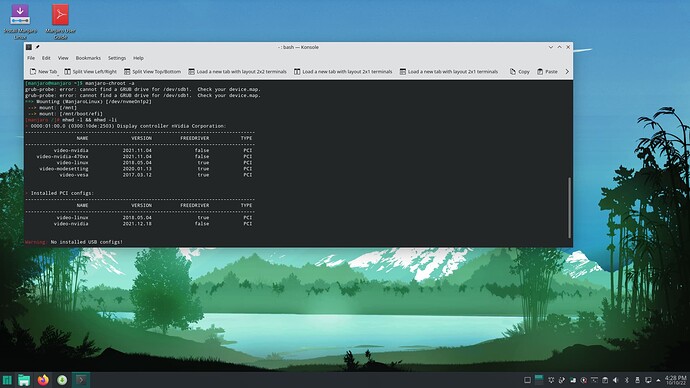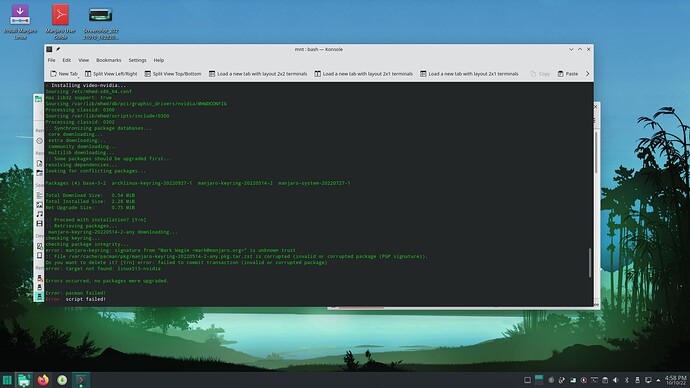Hi, just updated my system to a black screen after grub. I am on kernel 5.15.72-1, booting into the fallback is also a black screen. Booting into my backup kernel 5.10.147-1 black screen. I suspect maybe a incomplete update or something with kde plasma or possibly a Nvidia driver thing too. Any suggestions on what exactly to do?
since you mention nvidia, you may be affected with this:
Nvidia 3060RTX cards may have issues with the 515.76 driver:
- FS#75995 : [nvidia] Black X11 Screen and partial lockup when upgraded to 515.76 and dual RTX3060
- [Bug Report] Black X11 Screen and partial lockup when upgraded to 515.76 and dual RTX3060 - Linux - NVIDIA Developer Forums
can you enter into tty in the black screen? - press ctrl+alt+f2 - or f1-f6 keys?
Nope, crtl+alt+f2 & f keys does nothing at the black screen. Is there possibly another way to get to tty? I can get into the grub command line.
you need to boot into manjaro usb, and from there reinstall the nvidia, so prepare manjaro iso, boot into it, connect to inernet, open terminal, and chroot:
manjaro-chroot -a
then provide output from:
mhwd -l && mhwd -li
Hi, sorry for my delay here is where I am at.
I haven’t updated my Nvidia driver yet I wanted to ask what would be the proper way to do so?
Try installing the 470 driver. To do so, in the chroot environment, run the following:
- Uninstall the current drivers:
mhwd --remove pci video-nvidia
- And then install the
470one:
mhwd --install pci video-nvidia-470xx
And then reboot and see it it helped.
what mirdarthos says… and i add that the mhwd detects only nvidia gpu… so if you have only nvidia graphics, no intel, or amd, you can also uninstall video linux:
mhwd -r pci video-linux
@Mirdarthos you missed in the commands pci
Thanks. Added it.
Here is the results I was able to remove Nvidia drivers I am getting a bunch of errors when trying to download them.
It looks like your live USB’ kernel is old and EOL. which might be why this is happening.
Normally I’d say upgrade the kernel, but in this case, I think it’s better that you download a newer ISO, dd that to the thumb drive, boot with that, enter a chroot as you did here, and start the procedure again. Mainly because you won’t be able to install and use a new kernel on the Live system.
he is already chrooted, so the linux513 is on his system installed… post output from:
mhwd-kernel -li
Yeah it is an old ISO I was being a bit lazy, sorry about that. Will throw a new one on it.
Nope. According to my understanding, the kernel in a chroot environment is the one from the live image.
And in any case, 5.13 is EOL, so it has to be updated.
thats why i asked him to post the mhwd-kernel -li output…
and manjaro doesnt ship isos with non lts kernels, so it cant be from the iso, manjro ships only the 5.4, 5.10, and 5.15 lts kernels…
This one has an LTS kernel…
Hi! sooo my screenshot tool seems to be broken but the output of mhwd-kernel -li is:
[manjaro@manjaro ~]$ mhwd-kernel -li
Currently running: 5.13.19-2-MANJARO (linux513)
The following kernels are installed in your system:
- linux513
you mention above that you tried with 5.10 and 5.15 kernels, yet they are not shown as being installed … are you even chrooted?
Tip:
When posting terminal output, copy the output and paste it here, wrapped in three (3) backticks, before AND after the pasted text. Like this:
```
pasted text
```
This will just cause it to be rendered like this:
Sed
sollicitudin dolor
eget nisl elit id
condimentum
arcu erat varius
cursus sem quis eros.
Instead of like this:
Sed sollicitudin dolor eget nisl elit id condimentum arcu erat varius cursus sem quis eros.
Alternatively, paste the text you wish to format as terminal output, select all pasted text, and click the </> button on the taskbar. This will indent the whole pasted section with one TAB, causing it to render the same way as described above.
Thereby increasing legibility thus making it easier for those trying to provide assistance.
My apologies, I preformed the command in the non chroot environment.
manjaro /]# mhwd-kernel -li
Currently running: 5.13.19-2-MANJARO (linux513)
The following kernels are installed in your system:
* linux510
* linux515
This is the Live environment’s kernel. This is the one that’ll cause trouble, seeing as it’s actively being used.
The other two are LTS kernels and not being used, so the won’t cause problems.
Edit:
Try the following:
sudo pacman-key --refresh-keys
…in the chroot environment.
And then try and reinstall the drivers as previous.

